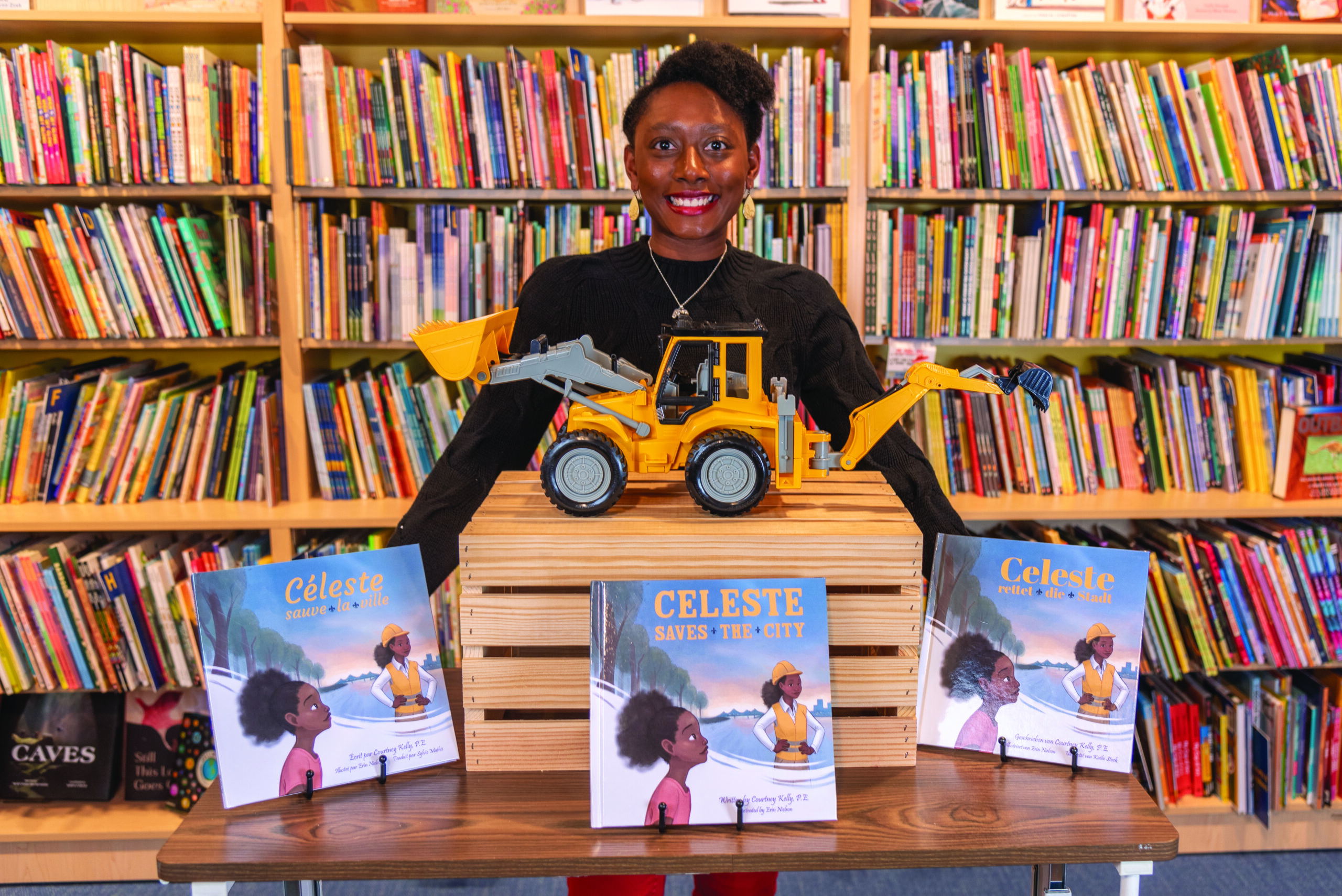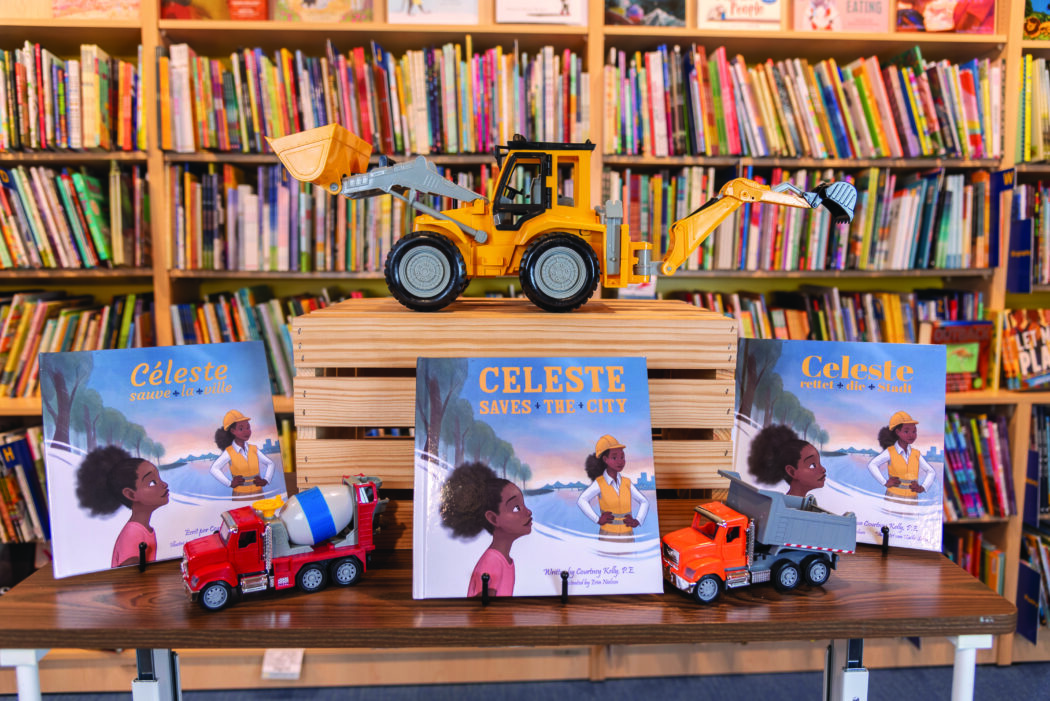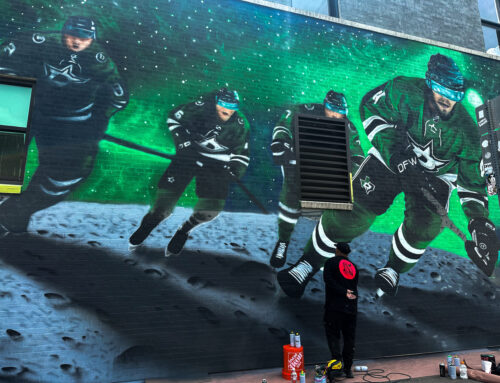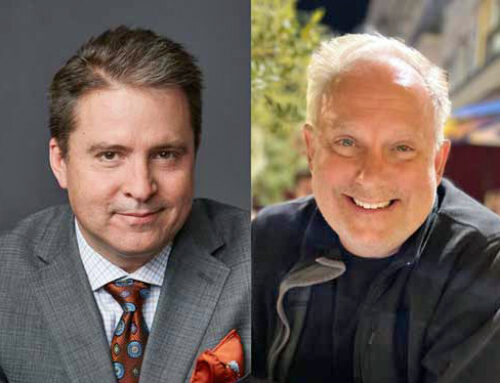
Courtney Kelly is the author of “Celeste Saves the City.” Photography by Julia Cartwright.
Courtney Kelly is an engineer, but as a child, it seemed certain she would be a veterinarian.
At the time, that career seemed like a natural fit for her. The farmhouse she grew up in always had an animal presence; her family owned several dogs, chickens and ferrets. Her father, a farrier, kept horses in the backyard. When veterinarians came to visit the horses, Kelly would shadow them and learn all she could about their job.
The farmhouse Kelly grew up in, known around her neighborhood as the Red Barn House, was located in New Orleans. Hurricane season was an unavoidable aspect of living in southern Louisiana, and the Kelly family was used to evacuating almost every year. Courtney was the family’s designated hurricane tracker. She would get maps provided at Popeyes and listen to the news to find out a storm’s longitude and latitude, and then she would plot out the storm’s course on her map.
One storm she didn’t pay much mind to formed early in her sophomore year of high school. It began as a tropical depression in the Bahamas, and after it became a hurricane, it weakened as it crossed Florida — but then it drew strength from the warm waters of the Gulf of Mexico and transformed into the infamous hurricane that decimated New Orleans.
“Katrina was not on my radar at all, at least to the extent that the intensity that the storm ended up being,” Kelly says.
Still, as they did with any hurricane, her family packed up and drove north to wait out the storm in Baton Rouge. Her mother and sister packed as much as they could into one car, and Kelly rode with her dad in the truck pulling a trailer full of their horses.
As she sat in bumper-to-bumper traffic, Kelly didn’t yet know that she would never live in the Red Barn House again.
“Here we are on the bridge, evacuating, all of these people having to leave their homes, but we really had no idea of how bad the city was going to be devastated,” she says.
Kelly spent the next few months at her aunt’s home in Baton Rouge. Kelly’s other relatives from New Orleans evacuated to Baton Rouge, too, and initially there were 24 people crammed into the three-bedroom house, usually jockeying for a spot in front of the television as scenes of the destruction filled the news broadcasts.
“Everybody was just kind of glued to the TV,” Kelly says.
The Kelly family was relatively lucky. The Red Barn House only had two feet of water inside and the family ultimately repaired the damage to it, but Kelly’s parents decided to relocate to Baton Rouge for the remainder of their daughters’ high school years. The next summer, Kelly’s parents encouraged her to attend a summer camp at Louisiana State University called “Recruiting into Engineering for High Ability Minority Students.”
“Basically, that program did its job,” Kelly says with a laugh. “It introduced me to all of these different engineering concepts, and civil engineering just kind of stuck with me.”

Photography by Julia Cartwright.
Over the next two summers, Kelly attended engineering programs at Worcester Polytechnic Institute and Elmhurst College. In the process, she left her dreams of becoming a veterinarian behind in favor of a career that she thought could help her hometown recover.
“I was like, ‘Alright, civil engineering is the way. If there’s going to be a thing that I can learn, where maybe I’ll get some knowledge (about how) I can somehow help New Orleans in the future, civil engineering is it,’” Kelly says.
Kelly went on to receive her bachelor’s and master’s degrees in civil engineering from SMU. She also received an MBA from Lamar University. Kelly lives in East Dallas and works as a project manager for a construction company, but she still drives back to Louisiana fairly often to visit her parents. On one such drive, she was listening to a podcast about singer Janelle Monáe. On the podcast, Monáe encouraged other Black women to tell their own stories.
“I thought, ‘You know what? She’s right. I have a story to tell,” Kelly says. On that drive to Louisiana, Kelly began dreaming about the book that would soon become Celeste Saves the City, a semi-autobiographical children’s book about a young girl who has to flee Hurricane Katrina, only to grow up, become a civil engineer and devote her life to ensuring such devastating floods never occur again. Celeste’s solution is wetland restoration, a form of “green infrastructure” that would help maintain Louisiana’s eroding coastline.
It took several years to go from the idea Kelly had on her drive to the book now on shelves. After she finished the manuscript, there was the matter of finding an illustrator and a publisher. When she could not find a company willing to publish the book, Kelly decided to create her own publishing company. Then, she had to broker deals with retailers. But those who know Kelly say it’s no surprise that she persevered through every challenge she faced.
“She is what I call a grinder,” says Karla Nivens, one of Kelly’s friends and mentors who has also written her own book. “She has the ability to problem solve, and then turn that into something creative, and then bring whatever that is to life.”
Kelly’s parents are proud of her achievements, but they’re not surprised that she’s accomplished them.
“We always considered her a child before her time,” says Karen, Courtney’s mother. “All of this, she found her own illustrator, she wrote the book and edited it and had individuals read it and edit it — she essentially had that dream, and she made it happen.”
Karen refers to Celeste almost interchangeably with Courtney, noting the striking physical resemblance between the two. That resemblance, according to Courtney, is intended to inspire the young Black girls who read the book. According to the National Science Foundation, Black women are currently severely underrepresented in Kelly’s field, making up only about 1.6% of those in science and engineering occupations. Celeste Saves the City demonstrates that despite the asymmetry, Black women can find success and satisfaction in civil engineering.
“I think about how many books that I picked up when I was a kid where I actually could see myself reflected in the pages, and what impact that can have on someone,” Kelly says.
While Kelly said she would love all the girls who pick up the book just to become engineers, her main goal is to encourage them to pursue their passions, whatever they might be.
“I want them to know that things are going to be difficult,” Kelly says, “but you can do it, like Celeste did it.”





